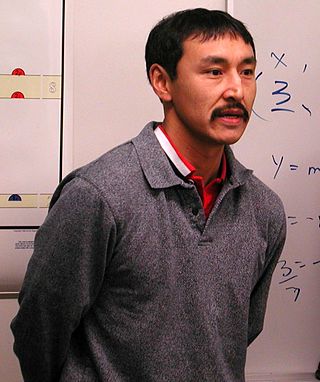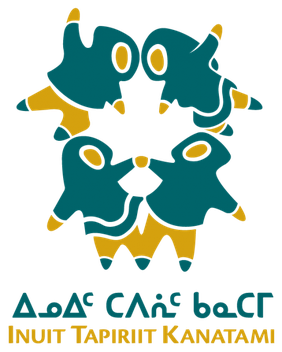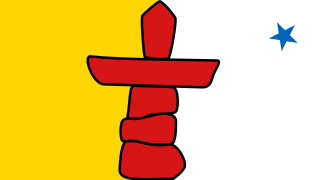Related Research Articles

The Northwest Territories is a federal territory of Canada. At a land area of approximately 1,144,000 km2 (442,000 sq mi) and a 2016 census population of 41,790, it is the second-largest and the most populous of the three territories in Northern Canada. Its estimated population as of 2023 is 45,668. Yellowknife is the capital, most populous community, and only city in the territory; its population was 19,569 as of the 2016 census. It became the territorial capital in 1967, following recommendations by the Carrothers Commission.

Devolution is the statutory delegation of powers from the central government of a sovereign state to govern at a subnational level, such as a regional or local level. It is a form of administrative decentralization. Devolved territories have the power to make legislation relevant to the area, thus granting them a higher level of autonomy.

Paul Okalik is a Canadian politician. He is the first Inuk to have been called to the Nunavut Bar. He was also the first premier of Nunavut.
The minister of Crown–Indigenous relations is a minister of the Crown in the Canadian Cabinet, one of two ministers who administer Crown-Indigenous Relations and Northern Affairs Canada (CIRNAC), the department of the Government of Canada which is responsible for administering the Indian Act and other legislation dealing with "Indians and lands reserved for the Indians" under subsection 91(24) of the Constitution Act, 1867. The minister is also more broadly responsible for overall relations between the federal government and First Nations, Métis, and Inuit.
Piers McDonald, OC is a Yukon politician and businessman. Born in Kingston, Ontario, McDonald, originally a miner by profession, is a long-time MLA, Cabinet minister, and the fifth premier of Yukon. He was leader of the Yukon New Democratic Party from 1995 to 2000.

The commissioner of Nunavut is the Government of Canada's representative in the territory of Nunavut. The current commissioner since January 14, 2021 is Eva Aariak.

The Northwest Territories Legislative Assembly, or Legislative Council of the Northwest Territories, is the legislature and the seat of government of Northwest Territories in Canada. It is a unicameral elected body that creates and amends law in the Northwest Territories. Permanently located in Yellowknife since 1993, the assembly was founded in 1870 and became active in 1872 with the first appointments from the Government of Canada.

Helen Mamayaok Maksagak, was a Canadian politician. She served as the commissioner of the Northwest Territories from January 16, 1995, until March 26, 1999, and as the first commissioner of Nunavut from April 1, 1999, until April 1, 2000. She is a notable Copper Inuk. Born on the land near Bernard Harbour in the Canadian Western Arctic, Maksagak was raised in Tuktoyaktuk, Aklavik and the Bathurst Inlet area and eventually settled in Cambridge Bay to raise a family of six surviving children with her husband John Sr. Together they were stalwart supporters of the growing indigenous rights movement in the Canadian north. Their home was often a stopping place and site of discussions when young Inuit involved in negotiating the Nunavut Land Claims Agreement or participating in Northwest Territories political life passed through the community.
Piita Taqtu Irniq, formerly Peter Irniq, is an Inuk politician in Canada, who served as the second commissioner of Nunavut from April 2000 to April 2005.

Inuit Tapiriit Kanatami, previously known as the Inuit Tapirisat of Canada, is a nonprofit organization in Canada that represents over 65,000 Inuit across Inuit Nunangat and the rest of Canada. Their mission is to "serve as a national voice protecting and advancing the rights and interests of Inuit in Canada."

The history of Northwest Territories capital cities begins with the purchase of the Territories by Canada from the Hudson's Bay Company in 1869, and includes a varied and often difficult evolution. Northwest Territories is unique amongst the other provinces and territories of Canada in that it has had seven capital cities in its history. The territory has changed the seat of government for numerous reasons, including civil conflict, development of infrastructure, and a history of significant revisions to its territorial boundaries.

The Northwest Territories division plebiscite was a stand-alone, territory-wide plebiscite conducted on April 14, 1982. This was the first territory-wide plebiscite conducted in Northwest Territories history. The results of the plebiscite would eventually lead to the creation of Nunavut, and spawn three other plebiscites during the creation process of the new territory.
Nunavut Tunngavik Incorporated is the legal representative of the Inuit of Nunavut for the purposes of native treaty rights and treaty negotiation. The presidents of NTI, Makivik Corporation, Nunatsiavut, and the Inuvialuit Regional Corporation, the four regional land claims organizations, govern the national body, the Inuit Tapiriit Kanatami (ITK) as its board of directors. NTI continues to play a central role in Nunavut, even after the creation of the Government of Nunavut. As the successor of the Tunngavik Federation of Nunavut, which was a signatory of the Nunavut Land Claims Agreement on behalf of Inuit, NTI is responsible for ensuring that the Nunavut Land Claims Agreement is implemented fully by the Government of Canada and the Government of Nunavut and that all parties fulfill their obligations.

Nunavut is the largest and northernmost territory of Canada. It was separated officially from the Northwest Territories on April 1, 1999, via the Nunavut Act and the Nunavut Land Claims Agreement Act, which provided this territory to the Inuit for independent government. The boundaries had been drawn in 1993. The creation of Nunavut resulted in the first major change to Canada's political map in half a century since the province of Newfoundland was admitted in 1949.
The Nunavut Land Claim Agreement was signed on May 25, 1993, in Iqaluit, by representatives of the Tunngavik Federation of Nunavut, the Government of Canada and the Government of the Northwest Territories. This agreement gave the Inuit of the central and eastern Northwest Territories a separate territory called Nunavut. It is the largest Aboriginal land claim settlement in Canadian history.
John Ningark was a territorial level politician in Nunavut Canada. He was a member of the Legislative Assembly of the Northwest Territories and Legislative Assembly of Nunavut.
Titus Allooloo is a business man and former territorial level politician from Nunavut, Canada. He served as a member and cabinet Minister of the Northwest Territories Legislature through two terms from 1987 until 1995.
John Amagoalik is an Inuit politician from Nunavik (Québec). He campaigned for Inuit rights and made a significant contribution to the founding of the Canadian territory of Nunavut. He was Chairman of the Nunavut Implementation Commission and is widely regarded as the "Father of Nunavut".
References
- ↑ "The Creation of Nunavut". Canadashistory.